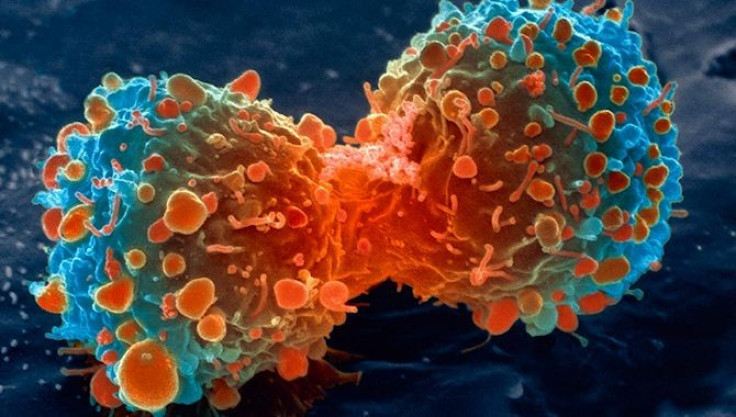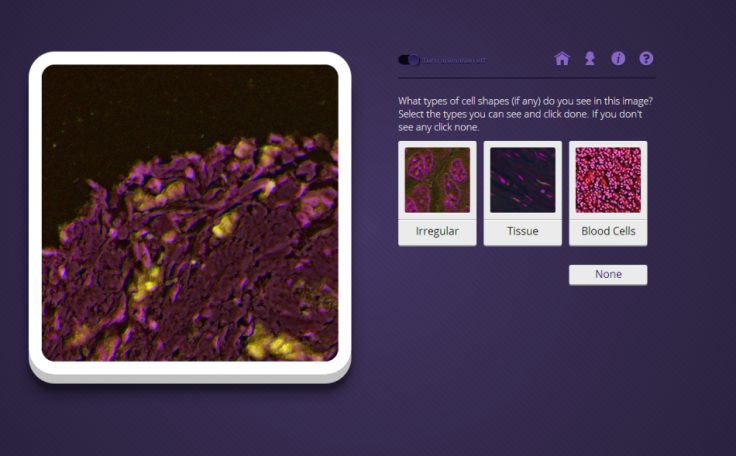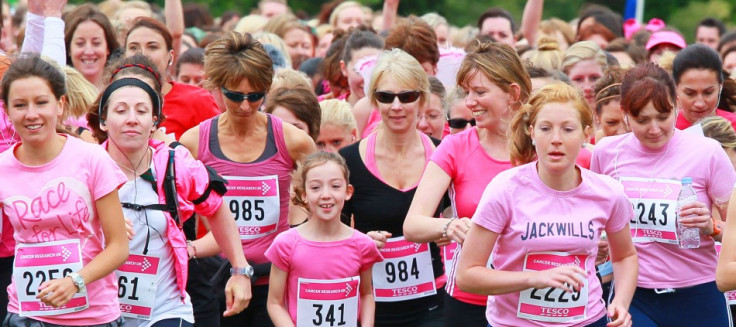New Videogame Aims to Help Cure Cancer
GameGene, a new smartphone game launched by Cancer Research UK, allows players to contribute to the cure for cancer just by playing.

Videogames are bad for your health, right? They encourage you to sit down, slumped on the sofa, boiling your eyeballs with a TV screen. Ever wondered why everyone's so fat nowadays? It's probably videogames. And if they are not vicariously clogging your arteries by keeping you lodged on the couch, they are definitely corroding your brain with all their violence, boobs and nonsense. Videogames are unhealthy.
Except they're not, obviously; videogames are improving our health every day. And I'm not talking about the Wii Fit or other jig-by-numbers pump like that. I'm talking about CellSlider and GameGene two projects by Cancer Research UK that let people contribute scientific research by playing vgames.
Data problem
CellSlider is out already and you can play it here. The "objective" if you like is to look at real slides of real tissue samples, and estimate how many cancer cells you can see.
GameGene on the other hand has just been announced and is out on smartphones (no word on operating system) later this year. Though gameplay specifics are yet to be revealed, the contribution to science will be similar to CellSlider; players will be helping Cancer Research by filtering and assessing data.
But it's nowhere as dry as it sounds - Cancer Research's Amy Carton says GameGene players won't even know they're doing science:
"The same as any organisation, Cancer Research UK has a big data problem. But the peculiar thing about our data is that it's cancer data, and we fundamentally believe that buried inside that data are clues that will lead to breakthroughs and then to cures.

"But there isn't a machine or algorithm in the world that's good enough to analyse that data, so it needs to be analysed by humans. That's what our scientists do day in, day out, but you can imagine that going through terabytes of data takes a hell of a long time. So, we needed to find a way to speed it up."
Cancer Research UK held a "game-jam" in March where it challenged 12 developers to create a prototype model in just 48-hours. Guerilla Tea, from Dundee, proved the winner and now GameGene will be used to sift through cancer data.
"We want the game to be so damn good people don't even need to know it's helping with cancer data," Carton continues. "Our scientists are world-leading. What we're taking away is the lower level data analysis that's needed in order to accelerate their work. It will free them up.
"By playing in those micro-moments like waiting for a train or for the coffee machine, people can contribute in meaningful way to our life-saving research."
GameGene
Unlike CellSlider, which asks players to sift through tumour data, GameGene is looking at cancer gene data and will be used to identify the point where the number of patient's cancer genes, or "copy number", begins to increase.
It's information too complex, Carton says, to be analysed by computers. At the same time, Cancer Research UK knows this kind of data can be worrying for some people, so the charity has had to find a way to make it accessible and playable, all the while taking care not to comprise the solid scientific results that are needed:
"Since one-in-three of us are going to be impacted by cancer, our data is pretty scary," Carton says. "However, this needs to produce robust scientific results, otherwise it's completely academic.

"In order to be robust, it needs to get through data quicker than we could ourselves and hit a benchmark for accuracy set by our scientists. So, we've been working with our scientists since March, who have analysed the different mechanisms that came out of the game-jam to determine which ones are likely to produce the best science. At the same time, the data will be abstracted, so users will be playing the game for the game's sake."
Citizen science
"Citizen science" projects, like GameGene, have been proven to work in the past. In developing CellSlider, Cancer Research UK worked with Zooniverse, a section of the Citizen Science Alliance which, in 2010, posted bytes and bytes of NASA space imaging data online and challenged web users to find new discoveries. Despite NASA's claim that everything in the data had been charted, the project has so far uncovered more than 35 new planets.
CellSlider, too, has been proven to work; Carton says that in just three months, the project worked through an amount data that would have taken Cancer Research more than a year and a half to organise.
"We could future-proof this, not just for cancer data but for other biomedical data," concludes Carton. "We've been approached by various charities which have recognised what we're doing as a potential solution for their own big data problems.
"This is just our starter for ten. What we hope is that the citizen scientist analysed data will help inform the machines of the future."
GameGene is out this autumn. If you want to make a meaningul contribution to cancer treatment, be sure to play it.
In the meantime, you can make a donation to Cancer Research UK here.
© Copyright IBTimes 2024. All rights reserved.






